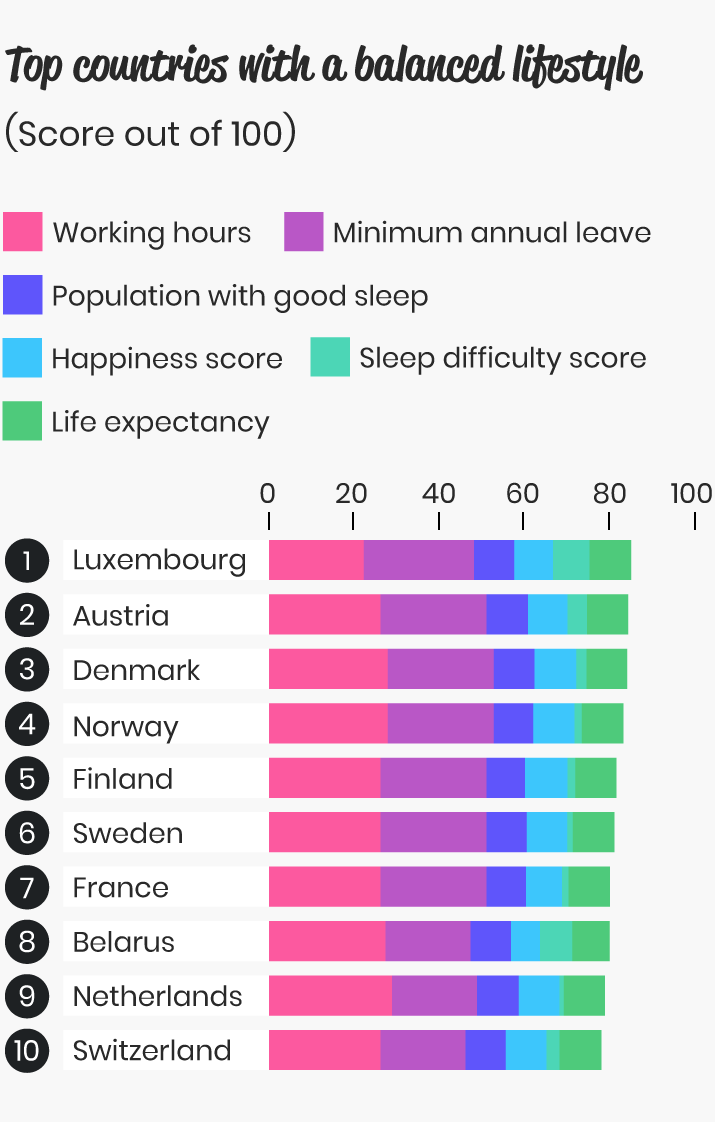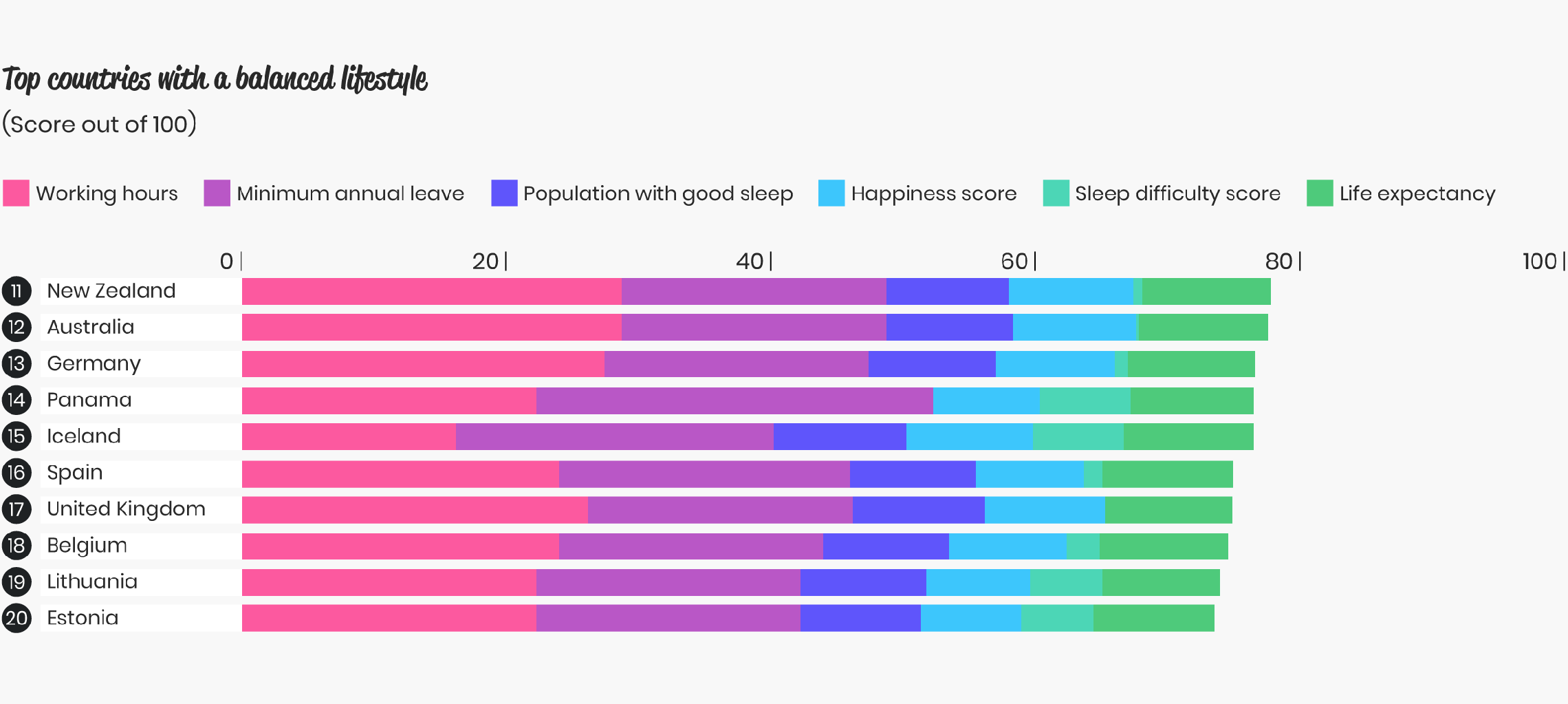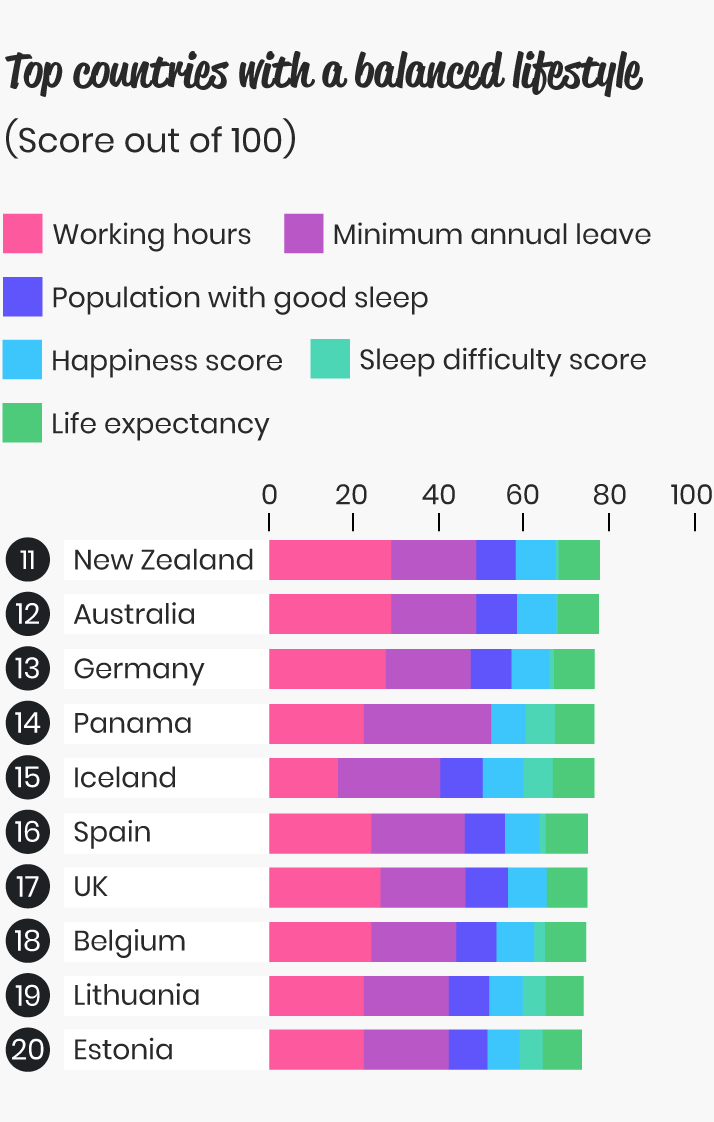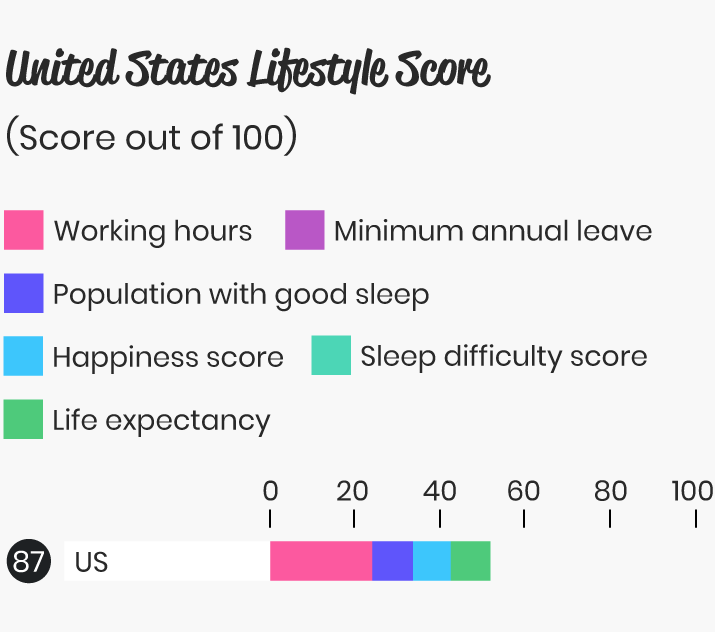Which countries have the best lifestyle balance?
In the hustle and bustle of today’s world, we often find ourselves jam-packing our days with activities, to-do lists, and work. In doing so, we forget how to look after ourselves. We deprive ourselves of many important things, such as getting enough exercise, eating a healthy, balanced diet, and, most importantly, we deprive ourselves of sleep.
For some, jobs operate on a 9-5 basis which does leave time to relax and sleep when the working day is over. However, for others, long working days can cut into those luxuries.
The effects of poor sleep can be detrimental to good health, as research reveals that those not getting enough sleep are at risk of type 2 diabetes, high blood pressure, obesity, respiratory disease, and more.
Here at Sleep Junkie, we wanted to find out what a ‘work-life balance’ really means across the world. We set out to research and reveal which countries are thriving when it comes to sleeping the most, working the least, and ultimately living the longest.
During the study, we analyzed several metrics to determine which country maintains the best lifestyle balance. The metrics explored include the average number of working hours and annual leave, the percentage of people getting a good night's sleep, as well as people’s happiness and life expectancy. The data also highlights how many people search the Internet for help and tips when they can’t sleep. Each metric was given a score out of 10, equating to an overall score out of 100.
Top 3 highest scoring countries for work-life balance
Pack your bags, we’re moving to Luxembourg. The small landlocked country in western Europe takes the crown as the best place in the world for lifestyle balance. Luxembourg received an overall score of 85.2 out of 100. More than half (53%) of its population gets between 7-8 hours of sleep a night, scoring the country 9.5 out of 10 in the sleep category. Not only that, but Luxembourg employers also reward staff with more annual leave the older they get - those over the age of 55 get on average 36 days of paid leave every year.
Austria comes in second place, with a total weighted score of 84.6 out of 100. The country boasts a 9.3 out of 10 for happiness and 55% of the population sleeps between 7-8 hours a night. It's no surprise the mountainous republic is on the leaderboard with its strong combination of good sleep and 5 more days annual leave than the UK, Belgium, and Lithuania. Due to this standard of work-life balance, Austria’s life expectancy is one of the highest in the world. Further research also reveals that 80% of expats in Austria have said their work-life balance has improved since moving there.
The bronze award goes to Denmark, gaining an overall score of 84.3 out of 100. Employees in Denmark work, on average, 34 hours a week which is 3 hours less than those in the USA. According to the OECD Better Life Index, about 2% of employees work long hours. Denmark’s happiness score was the second highest in the globe, at 9.8 out of 10. This data comes from its ranking in the 2019 World Happiness Report. In a place where healthcare is free and students are paid to go to college, it’s no surprise that Denmark is one of the best countries for a healthy lifestyle.
Unsurprisingly, Europe has been awarded as the best continent for lifestyle overall with all of the top 10 places being European.
Below are the 10 best countries on our lifestyle index:


How do the UK and USA compare?
When it comes to work-life balance, there are some major differences between Americans and Brits. The UK comes in 17th place, a huge 70 places in front of the US (87th place). When comparing the two countries, the UK comes out higher due to its shorter working hours and higher happiness score.


The US scored a dismal 51.8 out of 100, which could be due to its minimum annual leave score of 0, as employees are not legally entitled to any paid leave.
Despite the US’s low score overall, over half of its residents get between 7-8 hours of sleep a night and their life expectancy is 78.5 which is above average by 7 years.
Here are the results from the US:


Notably low countries
China, Mexico, and Malaysia all score below 40 out of 100 for lifestyle, with all three countries working on average 46 hours a week. Considering working hours are much longer in these countries, you would expect employees to receive more time off – however, this is not the case, with China only receiving 5 days of annual leave, Mexico 6, and Malaysia 8.
Why it’s important to get a good night’s sleep
It’s 3 a.m. and counting sheep to help you nod off is just not cutting it! You aren’t alone. Our research shows that much like the rest of the world, we often hunt through the Internet to help us get some shut-eye when we’re struggling.
To calculate our sleep difficulty score, we analyzed monthly search volumes for terms such as “I can’t sleep,” “how to sleep,” and more among residents in each country. Our data reveals that the US struggles the most, with a combined monthly search volume of 58,650 for all terms analyzed. In contrast, Luxembourg features a monthly search volume of just 90 for the related search terms. Despite this, 54% of residents in the US get between 7 and 8 hours of good sleep every night, so those monthly searches may be providing some useful tips and advice when it comes to getting much needed shut-eye.
In the National Sleep Foundation’s annual “Sleep in America” poll, they found that among US adults with excellent sleep health, nearly 90% said they felt very effective at getting things done each day, compared to only 46% of those with poor sleep health. The study also reveals that only 10% of Americans prioritize their sleep over other aspects of daily living. This goes to show that sleep is often the first thing that is sacrificed when there’s not enough time in the day to get things done, but a good night’s rest is essential to a healthy lifestyle – protecting you physically and mentally as well as boosting your quality of living.
More annual leave and fewer working hours are huge benefits in improving your work-life balance, but ultimately getting more sleep will help to lay the foundation for a healthy lifestyle. Not getting enough sleep can lead to a host of negative outcomes, that in turn can make it hard to effectively juggle work and life. For example, lack of sleep is associated with increased stress levels and decreased decision-making ability. These effects can play out not only at work, but also in other areas of life. However, the result of sleepless nights is more than just bad moods and a lack of focus. Regular poor sleep puts you at risk of serious medical conditions, including diabetes, heart disease, and obesity. This means not giving yourself enough time to sleep can be damaging to both your physical and mental health, providing even more reasons why you should prioritize sleep in your day-to-day life.





